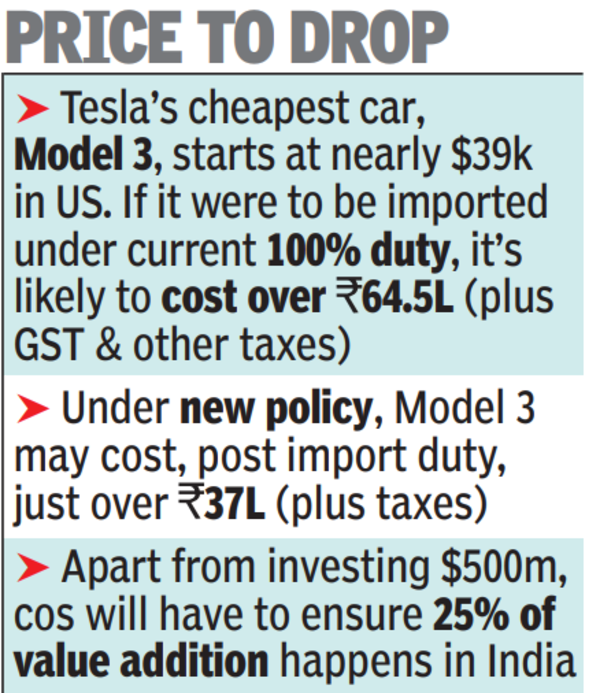The policy, crafted by the heavy industries ministry and the department for promotion of industry and internal trade, marks a major shift as govt shed its reluctance to cut customs duty for automobiles, a sector that has traditionally been protected by high tariffs.Currently, cars that cost up to $35,000 face 35% import duty, while those above the threshold attract 100% levy.

Tesla’s cheapest vehicle, the Model 3, starts at $38,990 in the US. If the company opts for the scheme, post import duty, the price will be around $45,000 (over Rs 37 lakh). It will also face 5% GST in addition to road tax and other levies.
While talks have been going on for several months, the policy was announced barely 24 hours before the model code of conduct for general elections is in place.
In its discussions with govt last year, the Elon Musk company had indicated that it may use India as the hub to produce lower-cost vehicles for the domestic market and for exports. Musk had met PM Modi and also held talks with commerce & industry minister Piyush Goyal.
Recently, companies such VinFast had announced its plan to invest $2 billion in India in setting up a facility in Tamil Nadu. With the application window to be opened over the next 120 days, the Vietnamese company may be eligible to apply.
Foxconn too is working on an electric car, although it’s looking at cheaper options. Some of the other players, such as BMW are also keen to get their EV portfolio to India.
Tesla’s rival BYD, which is already in India, is finding it hard to expand its capacity given the checks on Chinese investment. MG Motor, another Chinese company, is hoping to scale the FDI wall in partnership with Sajjan Jindal, given that the Modi govt has been reluctant in allowing companies from across the border to invest in the country.
Under the special regime for electric four-wheelers, companies that meet the minimum investment limit in plant and machinery and charging infrastructure will provide bank guarantees and start manufacturing in the country within three years of approval. They will also have to ensure that 25% of the value addition happens in the country. This has to be scaled to 50% in five years, the heavy industry ministry (MHI) said.
Separately, the revenue department – which cleared the scheme after a go ahead by finance minister Nirmala Sitharaman – has notified the modalities.
The scheme comes with the rider that a company can import a maximum of 8,000 cars annually. Given the duty benefit, the ministry has estimated that for vehicles with a landed price of $35,000 (Rs 29 lakh), around 26,000 units can be imported over the five-year period. Similarly, 11,764 e-cars of $50,000 can be shipped into India. The companies can also choose to import a mix of car that are under $35,000 and those that are costlier.
Govt intends to invoke the bank guarantees in case a company fails to meet the investment and domestic value addition norms.
“We invite global companies to come to India. I’m confident India will become a global hub for EV manufacturing and this will create jobs and improve trade,” commerce minister Piyush Goyal told reporters.
Although some of the homegrown auto companies, such as Tata Motors and Mahindra, which have lined up a portfolio to bolster their EV offering will be affected, govt officials said, the decision was taken after careful analysis, which showed that their offerings will not be affected.
India is the world’s third largest market with the average price of a car having increased from Rs 6 lakh to Rs 10 lakh over the last 10 years. Of the 40 lakh cars sold in 2023, 52,000 units or 1.3% of the market was in the above Rs 40 lakh segment, an analysis by MHI showed.
“The idea is to kickstart the four-wheeler e-car manufacturing in India, with very stringent kind of value addition norms while also ensuring that we allow imports in a very limited quantity,” DPIIT secretary Rajesh Kumar Singh said.